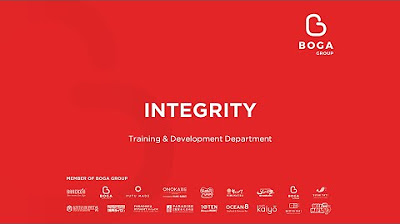Belajar 7 Habits. Part 3: Paradigma dan Prinsip (1)
Summary
TLDRIn this video, the speaker discusses the principles of communication and behavior change, focusing on the importance of integrity and consistent actions. They explain how certain techniques might not be applicable in all situations, emphasizing the need for authenticity and personal values. The speaker also stresses the importance of being honest and transparent in one’s actions, encouraging viewers to align their behavior with their principles. The video wraps up with a warm farewell and an invitation to join the next discussion.
Takeaways
- 😀 Principles are foundational to personal and professional effectiveness, serving as a guiding force in life.
- 😀 Shifting paradigms (ways of thinking) is crucial for meaningful personal growth and long-term success.
- 😀 True success comes from aligning inner character and beliefs with external actions, not just external achievements.
- 😀 Quick fixes and external techniques are ineffective without a solid internal foundation based on core principles.
- 😀 A mismatch between internal beliefs and external success can lead to dissatisfaction, even for highly successful individuals.
- 😀 The concept of 'Inside-Out' emphasizes changing your inner character before expecting lasting change in the external world.
- 😀 Personality traits and external success can be misleading; real excellence comes from cultivating strong character.
- 😀 Focusing on your internal paradigm and principles can create a lasting impact on your life and actions.
- 😀 Character is the bedrock of true success; it’s about who you are on the inside, not just what you achieve externally.
- 😀 Principles are timeless and universal, providing a solid foundation for building effective habits and behaviors.
- 😀 Self-awareness and understanding your internal paradigms are key to implementing meaningful change in your life.
Q & A
What is the primary focus of *The 7 Habits of Highly Effective People* according to the speaker?
-The primary focus of *The 7 Habits of Highly Effective People* is on transforming one's character and principles. The book encourages readers to develop an inside-out approach to effectiveness, where personal growth starts from within and is grounded in strong values.
How does the speaker differentiate between 'quick-fix' solutions and long-lasting success?
-The speaker criticizes 'quick-fix' solutions like NLP or positive mental attitude, which focus on short-term changes without addressing deeper issues. He stresses that true success comes from developing internal character and principles, not from external techniques or superficial adjustments.
What does the speaker mean by 'paradigm' and why is it important in the context of effectiveness?
-A paradigm refers to one's worldview or perspective. It is crucial because it shapes behaviors and decisions. The speaker suggests that understanding and transforming our paradigms—how we view ourselves and the world—is key to achieving true effectiveness and success.
How does the speaker connect the concepts of 'principles' and 'techniques'?
-The speaker explains that while techniques are useful for achieving specific goals, they are not as powerful or lasting as principles. Principles guide our actions from within, whereas techniques are external and may not lead to sustainable success without a solid foundation of character.
What does the speaker mean by 'inside-out' change?
-'Inside-out' change refers to the process of changing ourselves from the inside first, focusing on our character and principles before seeking external results. This type of transformation is more lasting and meaningful compared to external changes alone.
What is 'primary greatness' and how does it relate to success?
-'Primary greatness' refers to inner, character-based success, as opposed to 'secondary greatness,' which is outward success or accomplishments. True success, according to the speaker, comes from building a strong character, which leads to lasting impact and personal fulfillment.
What role do principles play in achieving long-term effectiveness?
-Principles play a central role in achieving long-term effectiveness because they are the foundation of sustainable success. They guide our decisions, actions, and relationships, ensuring that we operate with integrity and authenticity, rather than relying on temporary techniques.
Why does the speaker emphasize the importance of character over personality?
-The speaker emphasizes character over personality because personality is outward and can be influenced by external factors, while character is the internal foundation of our actions. Character shapes our true effectiveness and success, leading to genuine, lasting achievements.
What criticism does the speaker offer regarding modern self-help approaches?
-The speaker critiques modern self-help approaches that focus too much on external techniques or temporary solutions. He argues that they often ignore the importance of developing internal character and principles, which are necessary for true, enduring success.
What is the main takeaway from the speaker's discussion on personal growth and effectiveness?
-The main takeaway is that personal growth and true effectiveness are rooted in internal transformation. The speaker encourages focusing on developing character, understanding our paradigms, and living according to principles, rather than relying on quick fixes or superficial changes.
Outlines

This section is available to paid users only. Please upgrade to access this part.
Upgrade NowMindmap

This section is available to paid users only. Please upgrade to access this part.
Upgrade NowKeywords

This section is available to paid users only. Please upgrade to access this part.
Upgrade NowHighlights

This section is available to paid users only. Please upgrade to access this part.
Upgrade NowTranscripts

This section is available to paid users only. Please upgrade to access this part.
Upgrade NowBrowse More Related Video

SYUKURAN INDONESIA TANPA JOKOWI

INTEGRITY

เปิดสูตรลับเปลี่ยนตัวเองให้สำเร็จ ด้วยพลังของนิสัยเล็กๆ | Mission To The Moon EP.2299

KOMUNIKASI PENDIDIKAN ANAK

CARA BICARA AGAR DIRIMU DISUKAI BANYAK ORANG | Dr. Fahruddin Faiz | Ngaji Filsafat

MSQ - 05 - KONTINGEN PI IAIN BATUSANGKAR - "ETIKA BERKOMUNIKASI DI MEDIA SOSIAL"
5.0 / 5 (0 votes)